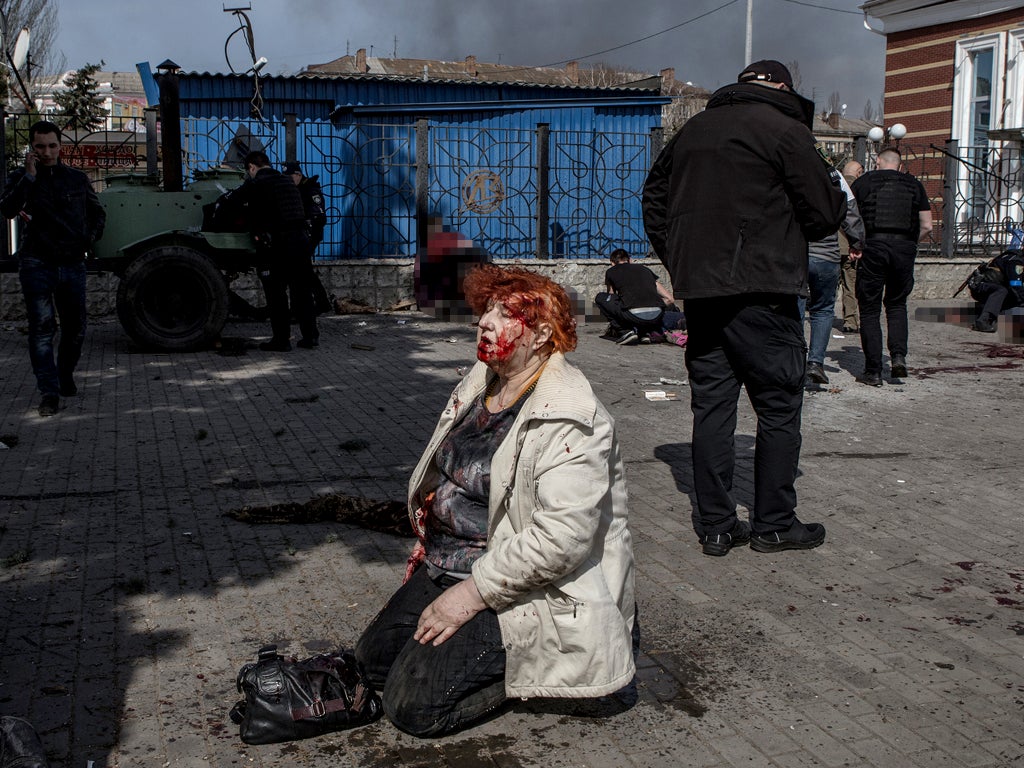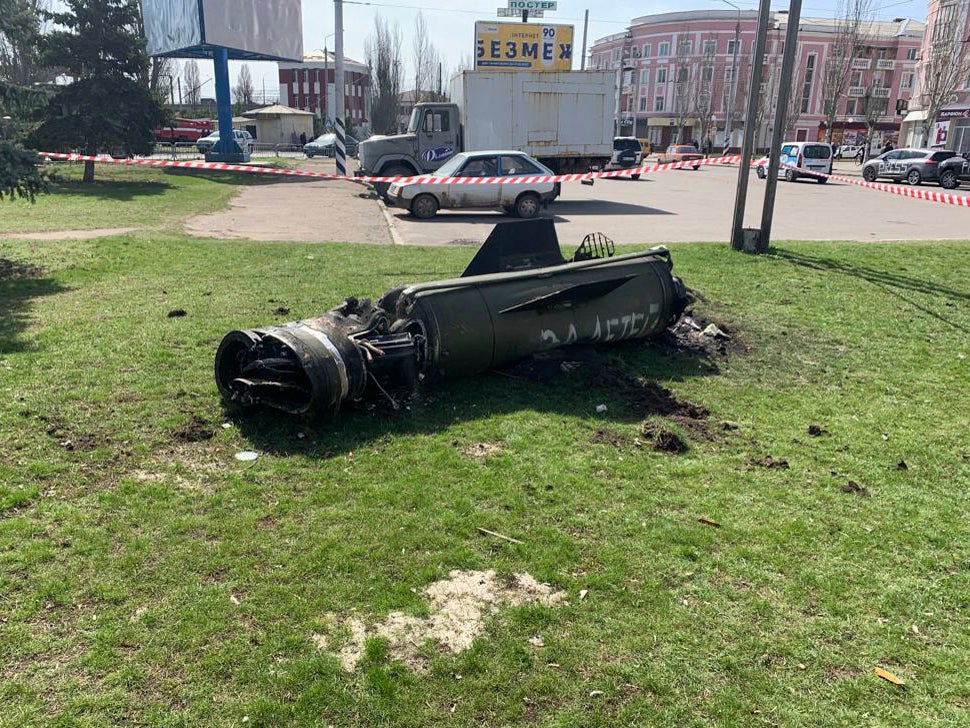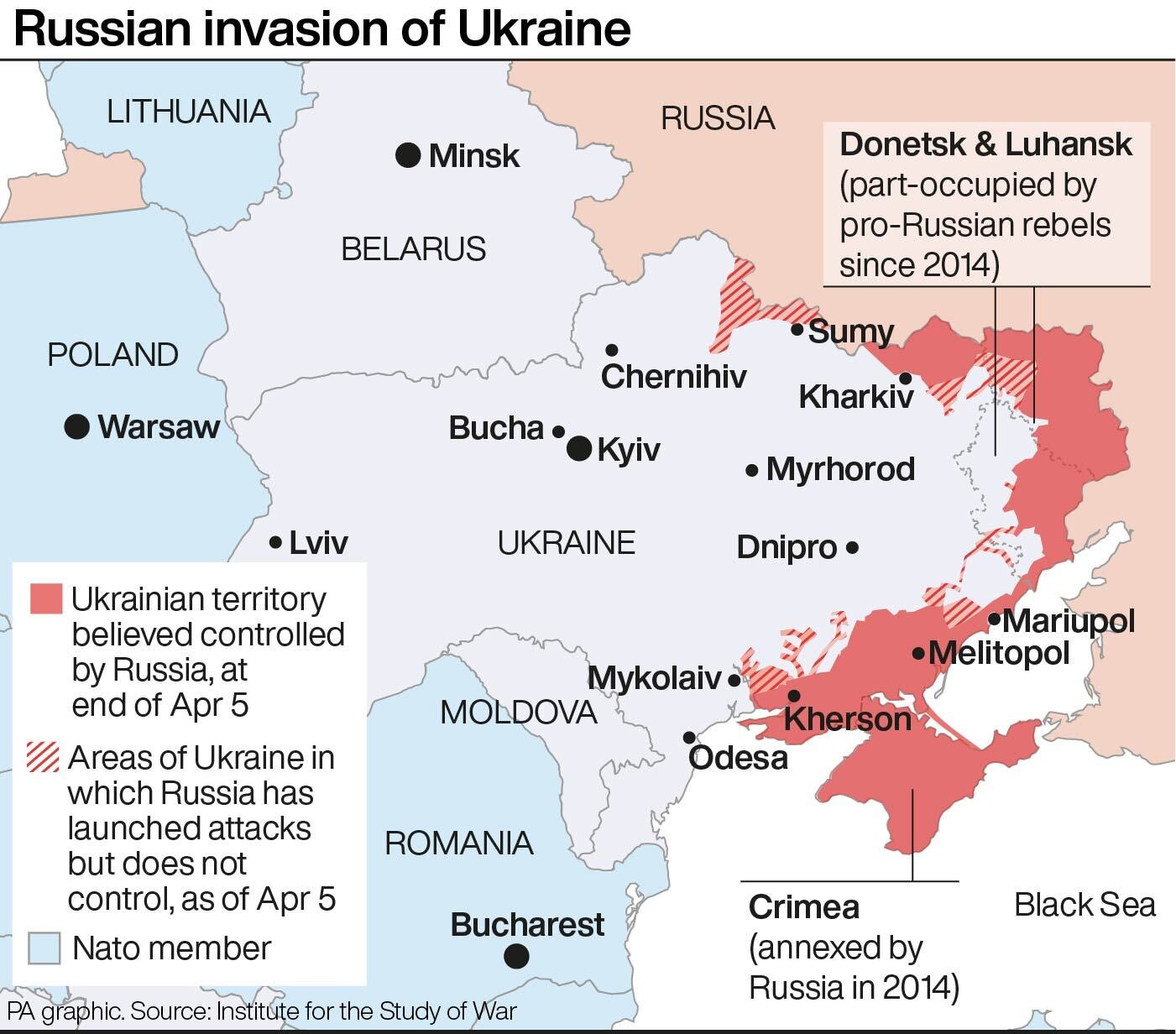
A Russian missile attack on fleeing civilians at a railway station was “unconscionable” and “will not go unpunished”, Boris Johnson said last night as he pledged £100m of new military aid for Ukraine.
At least 50 passengers, including five children, were killed in the attack at Kramatorsk in Donetsk where the station was being used to evacuate civilians from the war-torn east.
A missile shell found at the site had “for the children” written in Russian on it, according to images and video taken in the aftermath, which also showed bodies on platform benches and bloodied belongings including toys and a pram.
President Volodymyr Zelensky described Russia afterwards as “an evil with no limits”.
Mr Johnson suggested that Vladimir Putin’s invasion forces were guilty of a war crime.
“The attack at the train station in eastern Ukraine shows the depth to which Putin’s once vaunted army has sunk,” the prime minister said on Friday, at a Downing Street news conference alongside Olaf Scholz, the German chancellor.
“It is a war crime indiscriminately to attack civilians, and Russian crimes in Ukraine will not go unnoticed or unpunished.”
A United States defence official said the Pentagon believes Russian forces used an SS-21 Scarab missile, which is known as the Tochka in former Soviet states.
Pavlo Kyrylenko, the governor of Donetsk, accused Russian forces of using cluster munitions and said they “knew very well where they were aiming and what they wanted: they wanted to sow panic and fear, they wanted to take as many civilians as possible”.
Mr Zelensky also accused Moscow of killing civilians as part of its war strategy.
Oleksander Honcharenko, the mayor of Kramatorsk, estimated that roughly 4,000 people were at the station when the rockets hit.
“Some people have lost a leg, others an arm. They are now receiving medical assistance. The hospitals are carrying out about 40 operations simultaneously,” he told an online briefing.
In the aftermath of the attack, Eduard Basurin, a pro-Russia separatist commander in Donetsk, claimed Ukraine was responsible for the attack. Later, the Russian defence ministry denied responsibility for the rocket strike, describing suggestions to the contrary as “absolutely untrue”.

Washington decried the “horrific and devastating images” while foreign secretary Liz Truss said she was “appalled” by the reports, saying the targeting of civilians was a war crime. “We will hold Russia and Putin to account,” she added.
Ukrainian authorities had urged civilians in the east of the country to flee ahead of a predicted rise in Russian bombardments. The Kremlin has withdrawn its troops from northern Ukraine and is expected to deploy many of them to the Donbas region, which comprises the provinces of Donetsk and Luhansk.
“Evacuate! The chances of saving yourself and your family from Russian death are dwindling every day,” Serhiy Gaidai, the governor of Luhansk province, said earlier this week.
Three trains carrying evacuees to safety were blocked in eastern Ukraine when the line was hit by air strikes on Thursday.

Since Russia invaded Ukraine on 24 February, Moscow has repeatedly denied targeting non-combatants. However, the UN estimates that 1,611 Ukrainian civilians have been killed so far in the conflict, noting that the true figure is likely to be much higher.
Last week, the Ukrainian army recaptured many towns around the Kyiv, which had been occupied by Russian troops. In Bucha, a suburb to the north-west of the capital, three mass graves were discovered. At least 320 civilians were killed there, according to the town’s mayor.
Mr Johnson said Britain would be sending £100m of kit to Ukraine including more Starstreak anti-aircraft missiles, anti-tank weapons and “precision munitions” such as drones capable of loitering in the sky until directed to their target.
He also praised Germany’s “seismic” efforts to end its dependence on supplies of Russian oil and gas. But following the disclosure that the EU has spent €35bn on Russian hydrocarbons since the start of the invasion, while sending just €1bn in aid to Ukraine, Mr Scholz acknowledged that change would take time.







